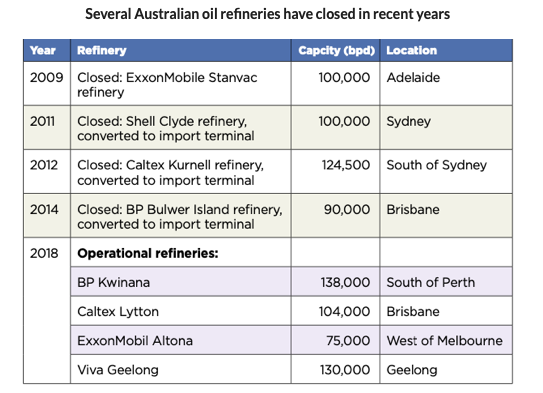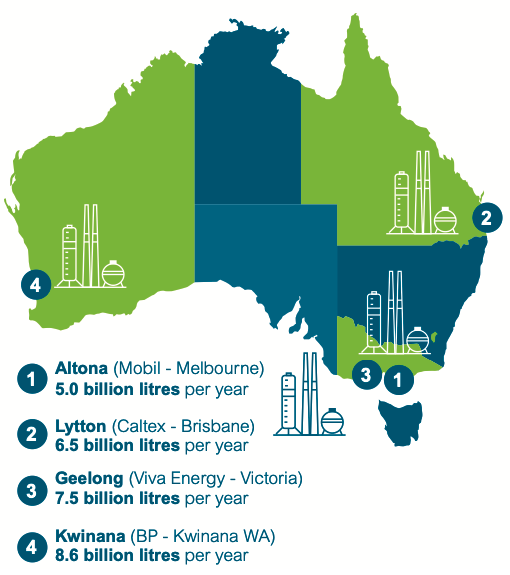Here’s what the Kwinana refinery closure means for Australia’s fuel security

Pic: Thana Prasongsin / Moment via Getty Images
- Australia will be left with only three refineries for oil products after Kwinana’s closure
- ‘Analysts expect that at least one of the refineries may close down, if not all of them’
- Kwinana closure has implications for fuel security, imports dependency, oil stockpile levels
Ending fuel production at BP’s Kwinana oil refinery in Western Australia will leave Australia with only three operating refineries and further increase the country’s imports dependency.
BP’s Kwinana refinery is the largest in Australia, employing 650 people, and will convert into an import terminal in 2022 after 67 years as an oil processing operation.
“Regional oversupply and sustained low refining margins mean the Kwinana refinery is no longer economically viable,” said BP in an October 30 statement announcing the refinery’s closure.
The oil refining sector in Australia has been under intense commercial pressure even before the COVID-19 pandemic decimated oil consumption, according to oil market experts.
“We are dealing with relatively small and older refineries here in Australia,” Dr Roberto Aguilera from Curtin University’s Oil and Gas Innovation Centre told Stockhead.
“Kwinana is indeed being closed down due to economic considerations. This is an issue not just in Australia but also in the industrialised world,” he said.
“That is because of increased competition in the form of expanded refining capacity in the developing world, including in Africa longer term, but particularly in Asia.”
Asia-based refineries expand oil fuels production
Asia will be responsible for most of the world’s growth in energy demand, and so in the coming decades Asian countries will continue to expand their refining capacity significantly.
“The refineries get built where they are needed, and in a global and interconnected business this means if there is an oversupply it puts pressure on the globalised industry, particularly on the industrialised world given the declining importance of oil in these economies,” Aguilera said.
Newer oil refineries in Asia tend to be larger and more efficient operations than those in Australia.
“Some of the newer refineries in Asia will be complex and large and can achieve significant economies of scale, and therefore they can produce products at less cost, and transporting the products is a lower proportion of overall costs,” said Aguilera.
Also, the supply of new crude products coming on to the global market is exceeding demand, because of sluggish economic growth and reduced transport use due to COVID-19.

Australia’s fuel security has risen up the political agenda
The ending of fuel production at the BP Kwinana refinery in WA throws into sharp relief Australia’s dependence on imported oil products and its vulnerability to supply interruptions.
Only two months ago, the Morrison government sought to address these concerns with a package of policy measures that included a pledge to build new fuel storage facilities, and to keep open Australia’s refineries.
“Fuel security underpins our entire economy,” said the prime minister at the time.
The International Energy Agency (IEA) recommends its member countries that include Australia hold emergency oil stocks equivalent to 90 days of net oil imports to guard against an emergency.
Australia has 20 days’ worth of diesel fuel in reserve, while for jet fuel and petrol supply levels are around 27 days and 25 days, respectively, according to reports.
“This [fuel security] has been an ongoing concern for decades for any country that is dependent on the import of strategic goods like crude oil or refined fuels,” Aguilera said.
“One of the measures taken to alleviate that worry is to hold stockpiles either of crude oil or refined products, and most consuming countries do have these inventories, and being part of the IEA they are supposed to hold 90 days of net imports,” he said.
“For a country that does not have much refining capacity, and it looks like we are going in that direction in Australia, then it makes sense to increase the proportion of refined products in the inventory at the expense of crude oil stockpiles,” he said.
“It is a short-term measure, even if we get up to the 90 days level, but it can be useful in the event of a disruption for logistical or technical reasons.”
Impact of refinery closure on energy security
Longer term, the conversion of the BP Kwinana oil plant to an import terminal could have far-reaching implications for Australia, its remaining refinery industry, and its fuel security.
“Kwinana was our only refinery, so now WA will be completely dependent on imports of crude oil products,” Aguilera said.
“Where imports come from is to be determined, but they will be from both other Australian states and from processing hubs in Asia such as Singapore,” he said.
Aguilera said the Kwinana refinery’s closure will change WA’s fuel supply chain for oil products.
“The result is the dependency is pushed further down the supply chain and we become more dependent on imports of refined products like petrol and diesel,” Aguilera said.
“It does create a headache for policymakers — any time a refinery closes anywhere in the world — because there is job losses and they don’t like being in that position of increased vulnerability when it comes to the import of important products like refined fuel,” he said.
Australia’s three other oil refineries on its eastern seaboard may also be at risk of conversion into import facilities in the near future.
“It will also depend on how the other refineries in Australia fare, some of those are at risk themselves even within the coming year,” said Aguilera.
“Analysts expect that at least one of the refineries may close down, if not all of them,” he said.

Related Topics

UNLOCK INSIGHTS
Discover the untold stories of emerging ASX stocks.
Daily news and expert analysis, it's free to subscribe.
By proceeding, you confirm you understand that we handle personal information in accordance with our Privacy Policy.








